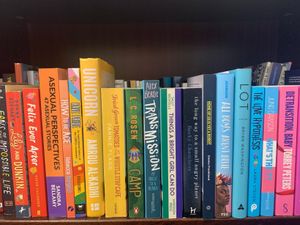Resource Hub
We prefer not to build bespoke solutions to shared problems when there isn't a good reason. Working together to create reusable shared assets makes a lot of sense, and aligns with our values of using open source software, building sustainable products, and collaborating openly with clients and partners.
In 2021 we worked with six small charities to define, test, and develop a solution to a problem they all faced: how to effectively publish resources for their (mostly) professional audiences. Our answer? To develop the Resource Hub distribution*.
*A ‘distribution’ is a bundle of code and configuration designed for a specific use-case that can be downloaded and installed and is (more or less) ready to receive content.
The initial idea to focus on the professional audiences was suggested by CAST, the commissioning organisation, whose Shared Service Platform initiative was aimed at helping small charities by creating reusable tech solutions to shared problems. Their research had shown that small charities had a common need to publish content to professional audiences.
Depending on the charity, these professional audiences might be teachers, healthcare professionals, policymakers, or in some cases informed parents and other advocates.
We knew from experience that by pooling resources and knowledge we could build something really good, and leave charities to focus their time and energy where it really matters – providing expert content.
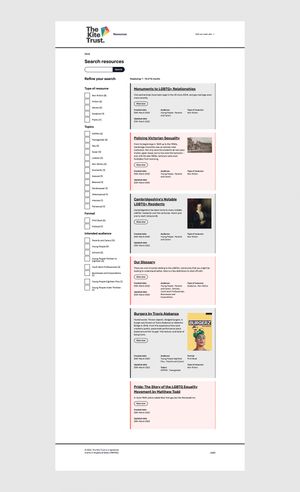
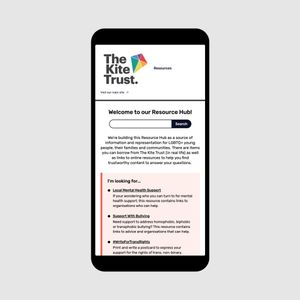
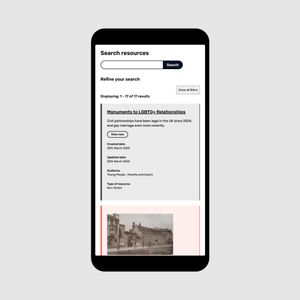
The Kite Trust is a tiny charity based in Cambridgeshire that provides support and information to LGBTQ+ young people, their families, and their communities.
Knowing that one of the issues LGBTQ+ young people face is never seeing people like themselves in books, The Kite Trust has compiled a library of hundreds of books doing just this. Over the pandemic they started offering a postal library service, lending out hard copies of these books to the community.
The Kite Trust's Resource Hub allows them to list the books online so that young people can find them more easily. They can either buy or borrow from a local library, or borrow them directly from the site. In time, The Kite Trust plans to add more of their own resources – such as their new podcast – alongside trusted content from other LGBTQ+ organisations. This site will be an invaluable resource for the young people of Cambridgeshire and beyond.
“The resource hub will help LGBTQ+ young people, their families and others around them to find information and representation that they can trust in an easier and faster way. With lots of misinformation online and still an under-representation of many identities in mainstream content, it's as important as ever for us to simplify the way that folks can access these resources.”
– Pip Gardner, The Kite Trust
User research
During the early stages of the project, we met with representatives from the six charities to understand their common needs in terms of functionality. We prototyped and tested this with them, iterating based on their feedback.
Features
Resource templates
The primary purpose is to publish resources so, perhaps unsurprisingly, we spent a lot of time getting that right. We wanted the template for adding a resource to allow for a lot of variation, knowing that people consume content in a lot of different ways. We wanted to allow for rich text, images, videos, and audio and external links. We also wanted to allow for multiple types of content on one page. We created a set of content sections (using the Paragraphs module in Drupal) to allow editors to build a variety of page types.
Categorising the resources
The distribution comes with four predefined taxonomies (or categories), which allow for tagging content across multiple dimensions:
- Audience (e.g. GPs)
- Topic (e.g. sex education)
- Resource format (e.g. video)
- Resource type (e.g. advice)
All the terms within each taxonomy term can be specified on a per-site basis. These taxonomies provide filters on the list of all resources, giving the end-user the option to filter the list to find what they are looking for.
Search
We built in a powerful search on the back-end, which indexes the resources to allow the users to search by keywords and refine the results by any of the categories. The search page is, by default, the homepage but can be overridden by site administrators.
Editorial curation
To curate resources manually, we’ve included a template that allows groups of content to be introduced. Examples might include a “Beginner's Guide” to a topic or a monthly round-up of new resources. These pages can also include external links to other trusted sources.
Appearance
While we relied heavily on the design guidance from Gov.uk, we knew that charities would want to put their own stamp on the site. We allowed for a certain amount of customisation through the user interface, so that administrators can add branding to the site without needing to call on a front-end developer.
Site administrators can use the UI to:
- Add logo and favicons
- Add the site name
- Add their branding colours
- Optionally display menus and other site-wide blocks
In time we hope to extend this to allow for more personalisation.
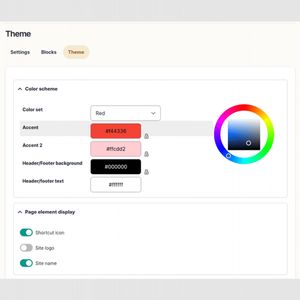
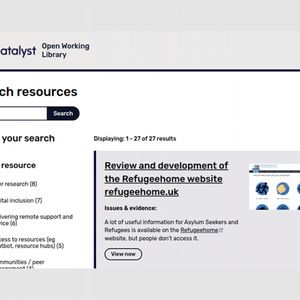
API
CAST also commissioned an optional module to provide a REST endpoint to enable the automatic creation of resources and the associated Drupal entities. This could be useful for organisations with a large number of existing resources who wish to automate the initial import.
What now?
The Resource Hub is being tested by a number of charities. We’re fixing bugs and producing new features all the time. One of the great things about the distribution approach is that as new features are released, current sites will benefit from them.
Upcoming features
There are several features we’d like to explore, including:
- Extending the search functionality
- More appearance customisation
- Print pages as (accessible) PDFs
- Syndication of content
We run a monthly meet-up for people interested in the Resource Hub, and we’re very keen to hear what features people would like next. This meet-up is also an opportunity for charities to share skills, and learn from each other; over time we’d like to make it a lively community.
The opportunity and problem with self-hosting
The distribution can be downloaded and set up from the git repository. It’s an open source project and we encourage anyone to download and install it. You can take it and extend it as you like. We also appreciate any and all contributions whether that be code fixes, bug reports, or documentation.
We also understand that many charities don’t have the technical capacity or confidence to self-host their own Resource Hub, or to run the necessary updates to receive security releases and new features.
We’ve begun writing documentation on how to go about this, but we appreciate that setting up and managing servers can be a daunting prospect. We’re happy to help when we can, and are looking at running some skills sessions on getting set up and running updates for people who are already a bit familiar with the command line.
Potential for a small SaaS offering
We have also begun experimenting with Software as a Service (SaaS). Agile Collective is able to set up, maintain and keep secure an instance of the Resource Hub for small charities for a fixed annual fee. This is something new for us, born of a desire to alleviate the frustrations of small charities, and we're looking at a model that is both affordable for small charities and sustainable for Agile Collective. More news in due course…
If you'd like to find out more about this, please get in touch.
